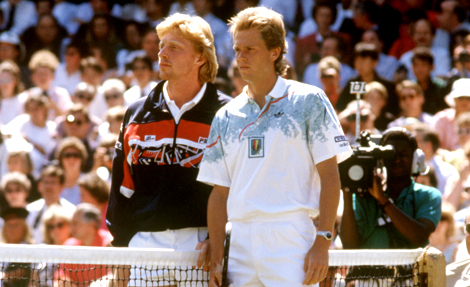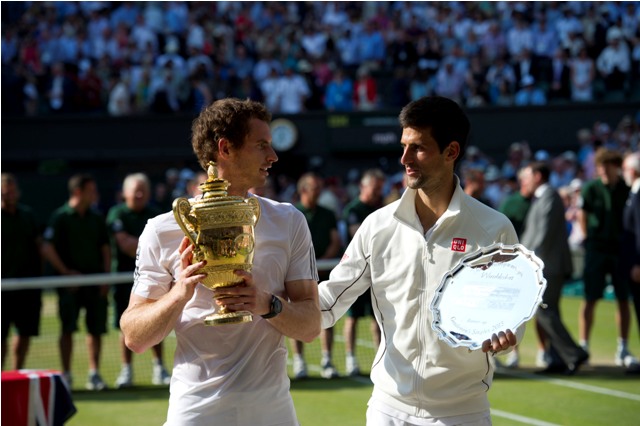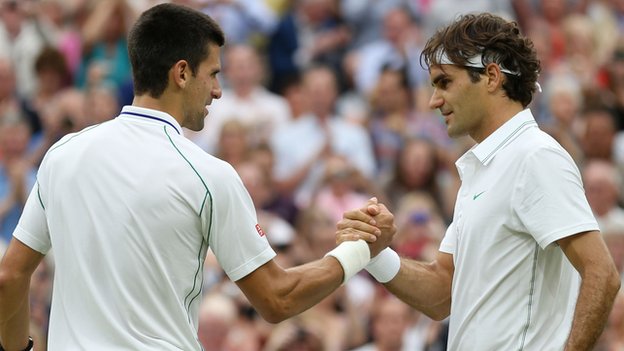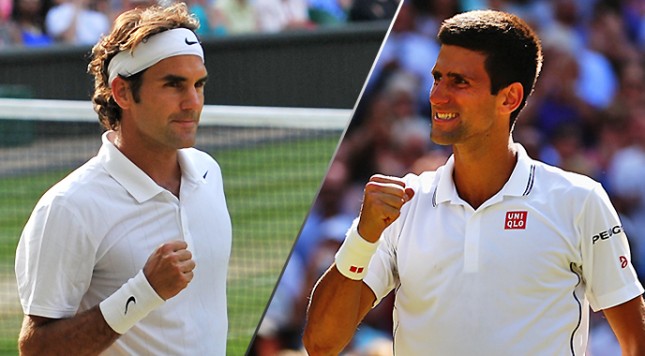One of the most influential figures in the history of modern tennis, Billie Jean King, has uttered one of the most succinctly profound truths about competitive athletics: “Pressure is a privilege.” If you’re feeling the butterflies that accompany a Wimbledon singles final or any other championship match, you’re enduring the pressure every tennis player wants to confront. Not having the pressure means not being able to compete for championships, for history, for glory.
Roger Federer knows this better than anyone.
After winning his ninth Wimbledon semifinal in nine tries on Friday against Milos Raonic, Federer embraced pressure — intellectually, of course. He told the assembled press the following about Sunday’s final against Novak Djokovic: “That I have another chance to go through these kinds of emotions is great.”
*
Andre Agassi famously wrote in his autobiography, Open, “I hate tennis.” Agassi came to love the sport, and his greatest conquests made his journey in tennis worth all the bad times. However, the statement accurately reflected how this child of tennis — whose life was consumed by the sport, as it must necessarily be for anyone who aspires to master it — frequently loathed the pressure that defined life on the tour. Agassi’s love-hate relationship with tennis perfectly explains why the son of Las Vegas encountered multiple boom-and-bust cycles in his career, wildly swinging from major-winning excellence one year to nothingburger barrenness the next. Agassi’s career, though an unquestioned triumph, was a career survived more than a career relished.
For Federer, it has been precisely the opposite.
Federer loves the tour. He loves the traveling. He loves both the journey and its destinations. He has bristled at questions in press conferences which doubted his love of clay or constantly shoved the retirement issue in his face, despite his repeated insistence that he loved to continue playing. Annoying press questions are one of the few things Federer doesn’t enjoy about the existence he has chosen for himself. Training, practice, match play — they’re all savored, even now, one month short of the Swiss’s 33rd birthday.
Yet — and this is where the drama of Sunday’s final truly begins — as much as Federer loves the pressure that’s part of tennis, said professions of love don’t mean he’ll handle the pressure.
*
We talked about “old-man nerves” on Wednesday, after Federer’s shaky finish to an otherwise solid win over Stan Wawrinka in the quarterfinals. The older athlete’s mind is so conscious of what another great victory would mean that it becomes harder to shut out the inner noise of the mind in a tense moment. The young or middle-aged athlete (middle age being one’s mid- to late 20s) is not quite in a position to reminisce or worry about “last chances,” which translates into a steadier focus on what’s ahead, what’s next. Federer and Djokovic, along with Rafael Nadal, have all shown how great they can be when in their primes, fueled by a mind that doesn’t drift or succumb to a bout of romanticism. (Nadal does this the best; Federer is an extremely close second, Djokovic a clear but strong third, as opposed to a “weak” third place.)
Federer, though, is no longer the destroyer of others’ dreams the way he was from late 2003 through January of 2010. He now occupies a mental space in which moments such as Sunday’s final really could be, if not a last chance, a rare chance within the context of what remains in his career. Applying last-chance finality to this match is patently foolish, because Federer — by getting to Sunday’s final in the first place — has already reaffirmed why he should never be written off with such certainty. Yet, since it’s taken two whole years for the Swiss to return to this kind of stage, it’s just as clear that there are no guarantees or assurances that he will return to a major final in the future.
Why does Sunday’s final rate as such a toss-up? While Djokovic is known for spilling his emotions in all directions on the court (as shown in his rollercoaster ride against Grigor Dimitrov in Friday’s semifinals), Federer is just as emotionally vulnerable, a point which simply doesn’t get enough coverage within the larger world of tennis.
Yes, Djokovic openly displays his emotions to an extent rarely seen from Federer; Djokovic provides what communications professors and students of Marshall McLuhan would call a “hot” presence on television. (Think of Howard Dean’s scream after the 2004 Iowa Caucuses — that was also a “hot” TV moment.) Federer, on the other hand, is generally “cold” on television, as he carries his poker face around the court, save for the occasional expulsion of a curse word or an expression of agitated disbelief. On the surface, these men emote in very different ways.
However, the surface emotions and vibes Djokovic and Federer give to a viewing audience should not be seen as reflections of the extent to which they handle pressure. After all, Djokovic — trying to pump up the crowd as he regularly does — surged past Federer in the fifth set of the 2011 U.S. Open semifinals after hitting “The Shot,” the return when down match point that turned an epic contest in his favor. Conversely, Djokovic was abnormally subdued and “cold” in the 2012 Wimbledon semifinal he lost to Federer, their only previous meeting at this tournament.
Being “hot” doesn’t mean your emotions always work against you or fly out of control. Similarly, being “cold” doesn’t mean your emotions are always perfectly calibrated. One of the great fallacies in sports is that an outwardly calm coach, such as Tom Landry of the NFL’s Dallas Cowboys, didn’t care as much as other coaches because of his glacial exterior. “Caring” is a measure of one’s bones and marrow, not the outer shell of a person.
Indeed, pressure — while often manifested on the outside — is always felt on the inside; some mask the extent to which they feel pressure, but the actual sensation of pressure can and does wear on any mind or temperament. Don’t judge a tennis player — or a book — by its cover.
With this in mind, there’s just as good a chance on Sunday that Federer will succumb to pressure. Djokovic isn’t the only one feeling the heat. It’s true that Federer has proven many more times that he can handle pressure, and he could very easily meet the moment with perfect calm when he takes Centre Court for his ninth Wimbledon final and his 25th major final.
The point is this: Two years after his previous major final, the topic of Federer’s mindset deserves (even demands) a great deal of focus on Sunday. How Severin Luthi and Stefan Edberg shape Federer’s mind will be just as important a consideration as the work Boris Becker does with Djokovic as far as the “inner game of tennis” is concerned.

Severin Luthi is Roger Federer’s main coach, but with that having been said, it will be impossible to ignore the presence of Stefan Edberg as a Federer consultant on Sunday, as the Swiss goes against Novak Djokovic, coached by Boris Becker. More than a quarter of a century ago, Edberg and Becker began a run of three straight Wimbledon finals against each other. Now, from the coaches’ box, these esteemed Wimbledon champions will watch two other Wimbledon champions fight for an elevated place in the sport’s history.
*
Novak Djokovic’s strong mental game was revealed to the world once again on Friday, as the top seed (who can become the No. 1 player in the world with a win in this match) typically worked through several conspicuously low valleys — and bad volleys — to outlast Grigor Dimitrov in four largely contentious sets. Djokovic, more than anyone else on tour, can play poorly for one or even two 20-minute stretches in a match and still manage to rescue himself at the end. Djokovic, fiery competitor that he is, knows how to sharpen his focus when the temperature rises on court. He’s not yet at a point where he must deal with the “old-man nerves” Federer is currently experiencing. Yet, Djokovic clearly has a mental block, and this is also part of why Sunday’s match against Federer is mostly a drama between the ears.
For the most part, this block is otherwise known as “Rafael Nadal in major tournaments,” but even against non-Nadal opponents in recent major finals, Djokovic has usually come up short. He defeated Andy Murray in the 2013 Australian Open final, but he lost to Murray in the 2012 U.S. Open final and the 2013 Wimbledon final. Though the Serbian superstar has made 12 of the last 16 major finals on tour (more than Nadal’s 10), he’s won only five of the previous 11 in that span of time, with Sunday being No. 12.
Consider this layered hypothetical: Had Djokovic been able to turn that 5-6 record in major finals (dating back to the 2010 U.S. Open final versus Nadal) into an 8-3 record, with two of those wins being against Nadal, the major-title count would be “Nadal 12, Djokovic 9,” instead of the 14-6 tally it actually is. Partly because of Nadal’s seven-month injury absence (2012-2013) but also because of his own competitive chops and his 2011 season for the ages, it’s quite reasonable to claim that Djokovic has been the best player in the world since the beginning of 2011. (Using a different time frame, since June of 2012, would obviously make Nadal the best player on the planet over a given period of time.) Yet, for all of his excellence, Djokovic lags well behind the two men who have set the gold standard in what has been termed the “Golden Era” of men’s tennis.

Novak Djokovic is still looking for a first French Open title, and he’s also searching for a second Wimbledon after losing to Andy Murray last year. The losses in major finals have piled up for Djokovic since June of 2012. It’s time for the Serbian superstar to make a stand and show a level of resilience that was missing in the 2012 Wimbledon semifinals against Federer.
On Sunday, while Federer confronts the reality that there are no guarantees of future major finals, Djokovic must stare down the pressure of a major final in a more present-tense fashion. There will be more of these moments for Djokovic, barring an injury or the kind of illness that has taken Robin Soderling from the ATP Tour. A great player from Serbia needs to be able to display ownership of such a moment once again.
*
The tactics of this match — like its foremost keys — are just not that complicated, another reason why the drama of the mind feels so central to the proceedings. This is a serve-and-return match. Federer’s first serve has to do damage, and Djokovic must conversely find ways to reset Federer’s first-serve points by blocking back floated returns that attain a reasonable degree of depth. When Djokovic — who failed to crush Murray’s cream-puff second serves in last year’s Wimbledon final — gets a look at a second ball from Federer, he has to tee off and impress upon his opponent the fact that second serves will be punished.
It’s true that Djokovic’s own serve can achieve a lot for him at times, but the weight of pressure Djokovic applies (or doesn’t apply) to Federer’s service games is far more likely to influence the shape of the match and the trajectory it ultimately acquires.
This is true to a certain extent for the vast majority of tennis players, but it’s especially true for Federer: The more he’s unbothered on his service games, the more the rest of his game flows, including his returns. The more Federer is crowded, bothered and bullied as a server, the more he is likely to press with his groundstrokes, leaking errors that flow from an opponent’s imposing presence on the other side of the net.
Need more convincing that the Federer serve versus the Djokovic return is the most important battle on Sunday? In that 2012 Wimbledon semifinal between the two, the hinge point came in the third set of a tied match, with Federer serving at 4-all and 30-40. Federer’s serve is effective to the extent that he gets great placement in the service box, but on that serve, Federer did not quite hit a T serve from the ad court. The serve hit a few feet from the center service line. The serve gave Djokovic a return he expects to hit 10 times out of 10.
The return floated long.
Federer eventually held for 5-4. Liberated by saving a break point — while Djokovic was simultaneously frustrated by his miss — Federer broke for the third set and then pounced at the start of the fourth, all while a low-energy Djokovic sprayed errors into the doubles alleys. Djokovic service games will certainly tell part of the tale on Sunday, but Federer service games are probably going to set — and maintain — the tone of this titantic tilt.

Federer might be better on current form, and he certainly has the style of play that’s made for grass, but Djokovic’s return game was quite poor in the 2012 Wimbledon semifinal between the two men. If Djokovic’s return is firing properly, Federer is going to have to hit many dozens of perfect serves just to stay in the hunt.
*
Novak Djokovic is the most psychologically fascinating and complex figure among the men who have come to be known as the “Big Four” in this era of ATP tennis. All four men, including Andy Murray, have authored richly detailed stories of triumph and pain, coexisting in different but vivid ways. Yet, it’s Djokovic who has combined the most turbulent outward expressions with a warm, generous, engaging personality and a high degree of sportsmanship, as shown when he conceded a point to Radek Stepanek in the second round of this Wimbledon tournament. Djokovic is the human case study I find to be the most mysterious. He is the person most cut out for a sprawling, two-hour 30 for 30 documentary on ESPN.
As for Roger Federer, the drama attached to him is the drama of his career more than his personality. Sunday’s moment looms so large for him because no one — not him, not Djokovic, not the press — can say whether he’ll return to this stage yet again.
Both men are such familiar and established fixtures within the larger landscape of men’s tennis and global sport. One (Federer) has made 23 straight major semifinals, the other (Djokovic) an awesome-in-its-own-right streak of 14. One (Federer) made 36 straight major quarterfinals, while the other (Djokovic) is working on a current streak of 21. One (Djokovic) has a current run of 12 major finals in 16 major tournaments, while the other (Federer) reached 18 major finals in a span of 19 major tournaments at his peak.
When Federer and Djokovic take the court on Sunday, they will be combining to make a 39th major final appearance (25-14, Federer), and the total number of major titles between the two will move from 23 to 24. One can legitimately and convincingly include Andy Murray in the longstanding “Big Four,” but in a spirit of reciprocal fairness, it can also be said that Federer and Djokovic, plus Nadal, have formed a Fabulous Three and lorded that trinitarian power over the rest of the ATP Tour as a group since late 2007.
We know Federer and Djokovic so well as players (not so much as persons). These legendary athletes have become an ingrained part of the lives of modern-day tennis fans and chroniclers.
Yet, on the eve of a blockbuster Wimbledon final — only the second major final to be contested by these two men — the most salient part of the drama is how well Federer and Djokovic will carry their emotions. Such a claim is merely that, a claim, and not a statement of fact. Yet, the mere suggestion that emotions will rule the afternoon at Centre Court shows how utterly compelling — and deeply important — this match has already become, well before the first ball is struck at roughly 2:10 p.m. local time in England.
Djokovic and Federer both want this win badly. Yet, they have to be prepared to not want it too much. Two men who have achieved so much in tennis have to keep their minds uncluttered when the moment demands it.

